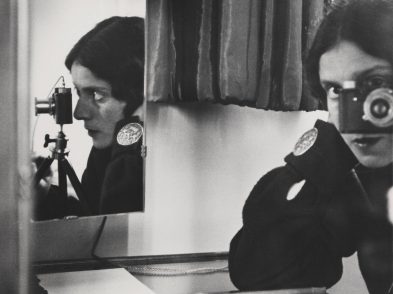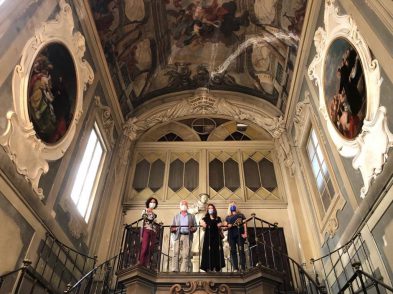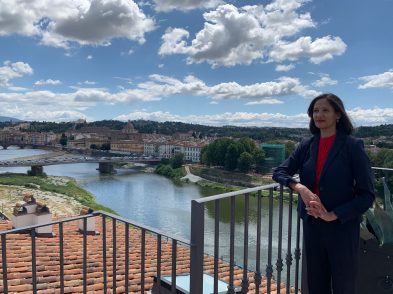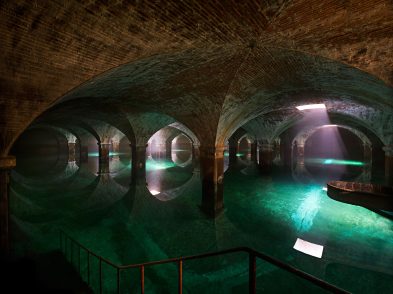It starts with the usual Thursday afternoon phone call. Supposedly, there’s an urgent manuscript waiting for me at the translation studio. Can I pick it up? Stay up all night to do it? Bring it by in the morning? My boss Niccolò grovels, and I agree to do it. But only if he promises to treat me to a caffè al tavolo at the Giubbe Rosse. It’s eight Euro for a cappuccino and brioche there, and after working under pressure I like to be treated like an intellectual.
On the morning of our last translation emergency, I stopped by the studio right after a trip to the hairdresser’s. She’d given me a pixie cut to go with my 1920s’ hat, and for all of five minutes I felt fashionable. In Italy, I can never make the feeling last longer than that. As soon as I walked in the door, my boss cocked his head to one side and studied me. In Italy, employers are allowed to react to their employees haircuts. I should have been prepared.
“That haircut makes you look like a nine year old,” he said.
“Nico! That comment would make me a millionaire in any courthouse in America. But, harassment aside, it’s not quite the look I was hoping for.”
“How can talking about your haircut be harassment?”
“Because it’s my hair and you have no business talking about it.”
“Americans worry about very irrelevant things.”
“Yeah, and Italians say very irrelevant things. Give me the manuscript.”
Unfortunately, though, there must have been some truth in his nine-year-old comment. Later that day I went apartment hunting. I had a few pre-requisites, I explained to the real estate agent. No student housing. Nothing too centrally located. Reasonably priced and unfurnished, please. I needed somewhere to put my sink. I was looking for a place where permanent people live.
The woman sized me up and apparently thought me to be at least twenty years younger than I am.
“Oh,” she said, “we have a flat here that fits your needs. Unfortunately, the landlord would prefer an adult.”
“An adult? Then, I think I qualify.”
“Oh, no,” she corrected herself, “I mean he wants someone who works. Someone with a salary.”
“Well,” I replied, visibly shaken, “usually, I just work for the glory. But sometimes they pay me.”
At the Giubbe Rosse, I shared my horror story with Niccolò. As is common, his response in no way reflected my pain. The only time Italians are bland is when you could really use a big reaction. The best I got was the off-handed question, “Did you introduce yourself as dottoressa?”
“Dottoressa? Of course not. I hate that.”
“Well, if you don’t play by the rules, don’t complain that the game isn’t working for you. In Italy, è tutto nel titolo, it’s all in the title. When it comes to earning respect in this country, nobility and holiness are best. Education earns you the next step on the social staircase. If you want to be treated well, it’s best to use your title. Here it doesn’t matter who you are, it matters who you seem. Dottore and dottoressa demand preferential treatment.”
“Yes, but why should it? Who cares about the fact that I have a stupid university degree? Customer service shouldn’t depend on a title. It’s for snobs and I hate it.”
Niccolò laughed. Essentially, he said, it didn’t matter what I liked or didn’t. What mattered was making the system work to one’s advantage. And we happened to be living in a system where people put their titles on their doorbells. Italy, he explained, has always been a class-based society. There is power in certain professions. Titles make one’s stocks rise. Professional school qualifications, like accountant and surveyor, will work too. But dottore or dottoressa are best.
I frowned. “In English, ‘doctor’ is only used for medical experts wearing lab coats.”
He smiled. “If you don’t believe me try it and see. Think of it as a cultural experiment.”
I spent the week that followed dottoressa-ing left and right. I called myself “doctor” in every email, introduction, and phone call. I said it at every bank, public office and real estate agency I visited. The results were astounding. Incredibly enough, I was offered coffee at the Comune, called back immediately for several decent housing opportunities, and was always greeted in the formal You. Like it or not, this doctor thing was producing results.
When the next urgent translation appeared out of nowhere, I stopped by Nico’s studio again.
“How like a secret agent you are looking today,” he greeted me.
“A secret agent? What is that supposed to mean?”
“Professional and glamorous.”
“Kind of like a dottoressa?”
“Better.”
“You know, I’ve been dying to kick someone in the shins all week. Maybe it will be you.”
“Don’t do it,” he said, “I could sue.”
They win in the end, you know? Dottoressa or not. They always win in the end.







